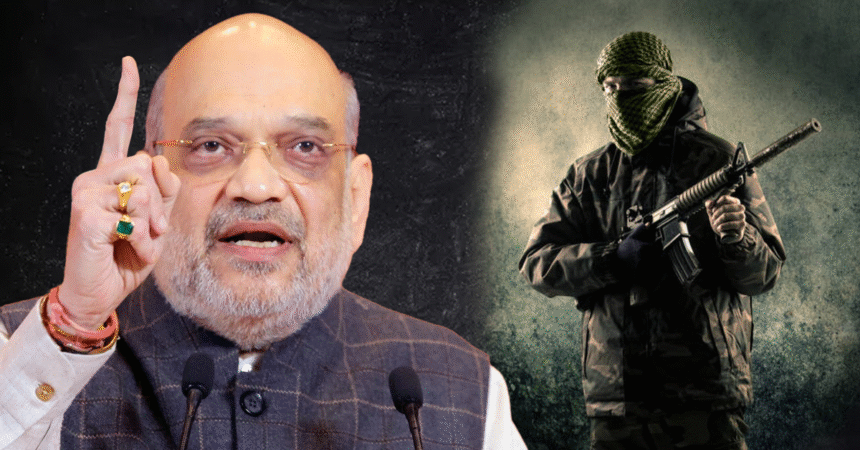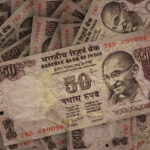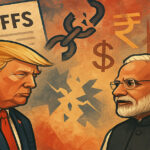Hindu terrorism debate : On July 30, 2025, Union Home Minister Amit Shah made a provocative declaration in the Rajya Sabha that has reignited one of India’s most contentious political debates. “I proudly say that no Hindu can ever be a terrorist,” Shah proclaimed, addressing opposition criticism of the government’s handling of terrorism cases. This statement comes amid a complex backdrop of legal cases, political narratives, and the recent acquittal of all accused in the 2008 Malegaon blast case.

Blockbuster Bonanza: Must-Watch Movies Releasing in India, August 2025
Hindu terrorism debate : The Parliamentary Context: Operation Sindoor and Political Rhetoric
Shah’s statement emerged during a heated parliamentary debate on Operation Sindoor, India’s military response to the Pahalgam terror attack. The Home Minister was responding to Congress leader P. Chidambaram’s criticism of the operation and defending the government’s counter-terrorism strategies. However, his categorical denial of Hindu terrorism reflects a broader political strategy that has evolved over nearly two decades.
The timing of Shah’s declaration is particularly significant, coming just one day before a special NIA court in Mumbai acquitted all seven accused in the 2008 Malegaon blast case, including former BJP MP Pragya Singh Thakur and Lieutenant Colonel Prasad Purohit. This acquittal effectively closed one of the most controversial chapters in India’s counter-terrorism history.
The Safest Family Vehicle for 2025
Hindu terrorism debate : Government Files and Official Contradictions
Despite public rhetoric denying Hindu terrorism, government documents reveal a more nuanced reality. According to investigations by The Caravan magazine, internal government files present significant contradictions to the BJP’s public stance. A classified circular dated March 28, 2019, from the Multi-Agency Centre (MAC) – led by the Intelligence Bureau and operating under the Ministry of Home Affairs – established a “Standing Focus Group of Terror Financing” specifically to monitor “Islamist & Sikh Terrorism”.
The document, signed by Colonel Devendra Mishra, Additional Deputy Director of MAC, notably excluded Hindu terrorism from its scope while acknowledging other forms of religious extremism. This selective approach in official documentation raises questions about the consistency between public statements and internal security assessments.
Latest Scientific Research on the Effect of Alcohol on Health

Hindu terrorism debate : Legal Cases and Court Verdicts: A Pattern of Acquittals
The trajectory of terrorism cases involving Hindu nationalist groups reveals a consistent pattern of acquittals that supports the government’s narrative while raising questions about investigative processes.
Malegaon Blast Case (2008)
The 2008 Malegaon blast, which killed six people and injured over 100, became the first case where Hindu extremists were prosecuted for terrorism. The Maharashtra Anti-Terrorism Squad, led by Hemant Karkare, arrested several individuals including Pragya Thakur, whose motorcycle was allegedly used in the attack. However, after a 17-year legal battle, all seven accused were acquitted in July 2025.
The NIA court cited several investigative flaws: the motorcycle’s chassis number was damaged beyond verification, prosecution failed to prove ownership, and evidence contamination rendered forensic reports unreliable. Judge AK Lahoti noted that while a blast occurred, the prosecution couldn’t establish that the accused were responsible.
Samjhauta Express Bombing (2007)
Similarly, the 2007 Samjhauta Express bombing case, which killed 68 people (mostly Pakistani nationals), ended in acquittals. All four accused, including Swami Aseemanand, were cleared by a special court in 2019. The court cited lack of evidence, with many witnesses turning hostile during the trial.
Pakistan’s government called the verdict a “travesty of justice” that reflected an “Indian state policy of promoting and protecting Hindu terrorists”. However, Indian authorities maintained that the prosecution failed to prove its case beyond reasonable doubt.

Earthquake Struck Russia’s Kamchatka: Breaking News Coverage
Hindu terrorism debate : The Evolution of the “Hindu Terror” Narrative
The term “Hindu terrorism” or “saffron terror” gained prominence during the UPA government era (2004-2014), particularly after the 2007-2008 terrorist attacks. Congress leaders, notably Digvijaya Singh and Home Ministers P. Chidambaram and Sushilkumar Shinde, used this terminology to describe attacks allegedly carried out by Hindu nationalist groups.
However, BJP leaders have consistently rejected this characterization. They argue that the Congress manufactured the “Hindu terror” narrative for electoral gains and to appease minority voters. The recent acquittals in major cases have emboldened BJP leaders to claim vindication of their position.
Barcelona Travel Blueprint: A Comprehensive 2025 Guide
Political Weaponization
The debate over Hindu terrorism has become deeply politicized. BJP leaders argue that linking terrorism to religion – particularly Hinduism – is fundamentally wrong and damages India’s social fabric. They contend that terrorism should be fought without religious labels, while simultaneously accepting terms like “Islamic terrorism” in official documents.
Congress leaders, meanwhile, maintain that terrorism has no religion but insist that all forms of extremism must be acknowledged and addressed. This creates a complex dynamic where both parties claim to oppose religious labeling while selectively applying it.
Investigative Challenges and Systemic Issues
The pattern of acquittals in “Hindu terror” cases raises important questions about India’s investigative and judicial processes. Several factors contribute to this trend:
Evidence Handling
Multiple cases have suffered from poor evidence collection and handling. In the Malegaon case, the court noted that “no sketch of the spot was done by the investigation officer while doing the panchnama. No fingerprint, dump data or anything else was collected for the spot”. Such investigative lapses make convictions extremely difficult.
Witness Testimony
A significant number of witnesses turned hostile in these cases. In the Mecca Masjid blast case, 66 out of 226 witnesses turned hostile. This pattern suggests either intimidation or genuine doubts about the prosecution’s case.
MG Cyberster Launches at ₹72.49L – India’s First Electric Roadster
Agency Transfers
Most cases were transferred from state agencies to the NIA, often resulting in changes to the investigation’s direction. Former Home Ministry officer R.V.S. Mani alleged in his book that the NIA was used to manufacture a “Hindu terror” narrative during the UPA era. However, these same cases later resulted in acquittals under NIA prosecution.
iQOO Z10R 5G Launched in India: Complete Price, Specifications & Features Guide 2025
International Perspectives and Security Concerns
International observers have noted India’s selective approach to terrorism investigations. The FATF mutual evaluation report on India highlighted the country’s understanding of terrorist financing risks but noted significant delays in prosecutions. The report mentioned various terrorist threats, including “regional insurgencies” and “left-wing extremist groups,” but did not specifically address Hindu nationalist organizations.
Human rights organizations have documented rising intolerance against minorities, particularly under the current government. However, these concerns are often dismissed as foreign interference by Indian officials.
SBI PO Prelims 2025: August Exam Dates & Preparation Guide
The Current Political Landscape
Amit Shah’s recent statement must be understood within the broader context of India’s evolving political landscape. The BJP’s electoral success has been partly built on a strong nationalist narrative that positions the party as India’s primary defender against terrorism. By categorically denying the existence of Hindu terrorism, Shah reinforces this narrative while delegitimizing opposition criticism.
The timing of his statement – coinciding with the Malegaon acquittals – appears designed to close this chapter of Indian political discourse permanently. BJP leaders are now demanding apologies from Congress leaders who promoted the “Hindu terror” narrative.
Google AI Overviews: A 2025 SEO Survival Playbook
Implications for India’s Counter-Terrorism Framework
The debate over Hindu terrorism has several important implications for India’s security apparatus:
Selective Investigations
The focus on certain types of terrorism while downplaying others may create blind spots in security assessments. If extremist elements exist across religious communities, selective attention could compromise national security.
Hindu terrorism debate : International Relations
The handling of terrorism cases affects India’s international image and relationships, particularly with Pakistan. The Samjhauta Express case acquittals strained India-Pakistan relations and undermined peace efforts.
War 2 Movie: Hrithik & Jr NTR’s Epic Battle Awaits
Social Cohesion
The politicization of terrorism investigations risks deepening communal divisions. Whether acknowledging or denying religious terrorism, the approach must serve national unity rather than political interests.
Hindu terrorism debate : Expert Analysis and Future Outlook
Security experts remain divided on the issue. Some argue that terrorism should be addressed without religious labels, focusing on criminal acts rather than ideological motivations. Others contend that understanding the ideological basis of terrorism is crucial for effective counter-terrorism strategies.
The pattern of acquittals in Hindu terrorism cases suggests either successful judicial processes clearing innocent individuals or systemic failures in investigation and prosecution. The truth likely involves elements of both, reflecting the complexity of India’s legal and political systems.
Conclusion: Beyond Political Rhetoric
Amit Shah’s parliamentary statement reflects the BJP’s consistent position on Hindu terrorism, now seemingly validated by court acquittals. However, the underlying questions about extremism, investigation quality, and political influence remain unresolved.
The government’s categorical denial of Hindu terrorism, supported by internal documents that acknowledge other forms of religious extremism, creates a complex narrative that serves immediate political interests while potentially compromising comprehensive security approaches.
As India continues to face diverse security challenges, the focus should shift from political point-scoring to ensuring effective, impartial investigations of all forms of terrorism and extremism. Only through such an approach can the country build a truly secure and inclusive society that transcends political divisions.
The debate over Hindu terrorism ultimately reflects broader questions about India’s identity, security priorities, and commitment to equal justice under law. These questions will likely persist beyond current political cycles, requiring sustained attention from policymakers, civil society, and citizens committed to India’s democratic values.










